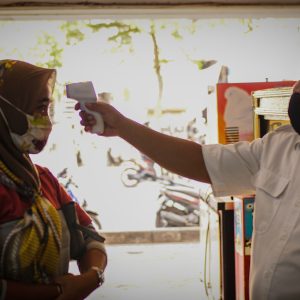Bacterial lysates are immunizing vaccines that can protect the body against recurrent respiratory diseases. They are administered orally, in the form of tablets, granules, capsules, or aerosols. They are available only by prescription and can usually be used by children over 3 years of age.
Why do we get sick?
Respiratory tract infections are the most common cause of medical appointments, especially in children. An infection is considered to be recurrent in children aged 2 to 4 years when it occurs 6 to 8 times a year. Most children go through 20-30 infections in the first 4 years of life. However, this is not a cause for concern and does not constitute grounds for suspecting an immune disorder. Infections are a necessary part of the immune system’s development. Through contact with antigens, the body learns to fight this type of threat. Childhood infections are extremely common due to the number of microorganisms and ongoing contact with peers in nurseries, kindergartens, and schools. In older children, infections are considered to be recurrent when they take place 6 or more times within a single year.
There are a number of factors that may contribute to the frequent occurrence of infections. These include:
• environmental factors (exposure to pollution)
• allergies,
• in some cases, serious immunity disorders, which parents are so often unnecessarily worried about,
• insufficient physical activity,
• poor sleep hygiene,
• stress,
• bad eating habits.
Recurrent infections can also be caused by excessive and unjustified use of antibiotics. One often-overlooked factor is the exposure to tobacco smoke breathed by the child’s parents or guardians, which has a very large impact on the infections’ frequency.
How does vaccine immunization work?
Vaccines are biological preparations administered to develop resistance to certain pathogenic microorganisms. The antigens contained in vaccines, when introduced into the body are supposed to simulate a natural infection and push the body to develop immunity similar to that which it would produce through a real infection. This allows for the production of antibodies and the creation of an immune memory, which translates into much better response to the disease upon repeated infection.
Since humanity is currently facing an impending antibiotics crisis, new methods of fighting infections are constantly being sought. One of the devised solutions is the administration of oral, non-specific vaccines called bacterial lysates. Bacterial lysates are dead, chemically or enzymatically lysed bacterial cells or fragments thereof. Unlike most classic, specific vaccines, they are introduced into the body orally. They contain many different types of bacteria, especially those responsible for respiratory tract infections, including:
• Streptococcus pneumoniae,
• Streptococcus pyogenes,
• Staphylococcus aureus,
• Moraxella catarrhalis,
• Neisseria cararrhalis,
• Klebsiella pneumoniae,
• Haemophilus influenzae.
Vaccines work on immunity by stimulating the body’s natural defenses. As a result of contact with the antigen, the level of natural immunoglobulins, mainly IgA, increases, which protect the mucous membranes such as those found in the respiratory system. The fight against bacterial antigens contained in the lysate serves as a training battle for the specific immune system.
Research has shown that lysates exhibit the ability to reduce infections caused by both bacteria and viruses other than those that were used to manufacture the preparation.
The mere presence of various antigens stimulates the mechanisms of non-specific immunity, which is what gives lysates their ability to potentially help fight off viruses. Therefore, lysates stimulate both the specific (mainly through granulocytes, mast cells, and NK cells) and the nonspecific immune system (through T and B lymphocytes). This stimulation causes intensive synthesis of immunoglobulins: IgA, IgE, IgG, IgM, and cytokines. Due to their non-specific function, lysates can provide a better immune response to various pathogens, including those with which the body faces for the first time. This makes for more effective protection in the event of various types of infections.
Immunization vaccines – who are they for?
Numerous scientific studies have proven that lysates help reduce the frequency of seasonal infections of the respiratory system, which in turn decreases the need for the consumption of antibiotics.
Clinical studies have shown that bacterial lysates can reduce the incidence of infections in children and adults by up to 30-40%.
For children, orally administered immunization vaccines can play a significant part in the prevention of frequently recurring respiratory diseases, such as pharyngitis, laryngitis, tonsillitis, or angina, as well as bronchitis, sinusitis, and inner ear inflammation. Some oral vaccines have shown effectiveness both in prophylaxis and in therapy.
Non-specific vaccines come in the form of tablets, capsules, granules, and aerosols. Some of them can be given to children from the age of 2, but most of them only from the age of 3. Immunization vaccines are products that should not be used without medical supervision and are therefore only available by prescription. They should only be taken after excluding any abnormalities in the structure and functioning of the respiratory system.
In summary, stimulating the body’s immune system with bacterial lysates is a very effective method of preventing both bacterial and viral respiratory infections. The safety of their use has been confirmed by numerous scientific studies. Acquiring immunity as a result of oral vaccination is a long-term process, sometimes taking several months, as the body’s immune mechanisms are gradually stimulated. It is worth considering beginning the therapy in the summer to prepare the child’s immune system for the challenges waiting for it during the fall and winter.










